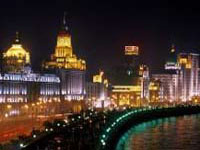 Shanghai OverviewShanghai, home to almost 12-million people, is China's largest
city and is situated in the centre of the coastline where the
Yangtze River flows through its delta into the East China Sea. The
name of the city means 'on the sea', and most of the city
(including Chongming Island) is only a few metres above sea level,
criss-crossed by a maze of natural waterways of the Taihu drainage
basin. Shanghai is China's industrial and commercial capital. It is a
busy seaport, and a science and technology centre, and has a
vibrant business community. Visitors come to Shanghai not for its
scenic beauty or history (the city is too young to have cultivated
a classical heritage), but those who arrive on business can find
plenty of off-duty entertainment and relaxation. Just walking the
busy streets and soaking up the vibrant atmosphere is worthwhile,
and there are some temples and gardens to visit along with an
excellent museum. This great cosmopolitan metropolis has a colourful colonial
background which had the edge rubbed off of it during half a
century of Communist rule. It was the first Chinese coastal port to
be opened to Western trade in 1843, resulting in an influx of
British, French and American diplomats and business interests, each
of which established their own independent enclaves. In the 1920s
and 30s Shanghai was regarded as a glamorous, decadent and
fashionable place to visit. It all ended with World War II and the
coming to power of the Communist party, but since the early 1990s a
dramatic re-building programme has been underway which is aimed at
putting Shanghai back on the map as a major international finance
and trade centre. The World Financial Centre, completed in 2008, is
one of the tallest buildings of them all and the world's tallest
hotel. |